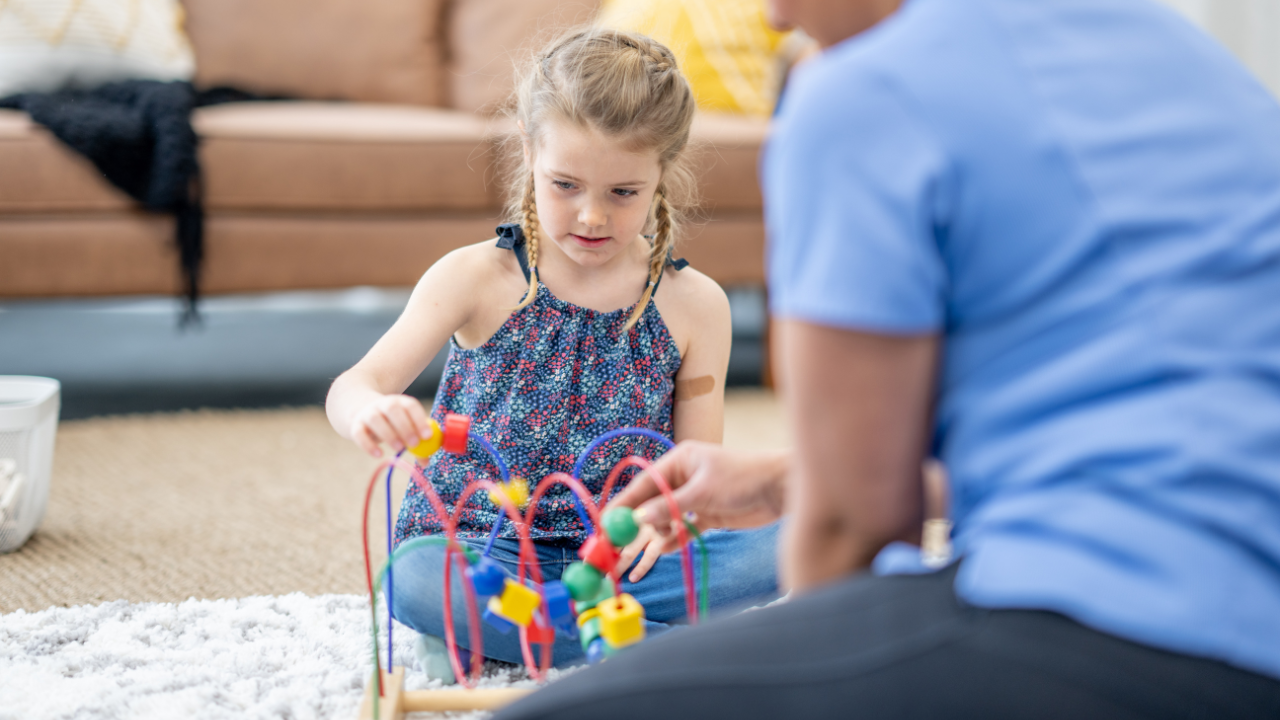Parent Child Interaction Therapy (PCIT): Why it's great + How it falls short
Apr 22, 2025
Hi there! I'm Danielle. I help defeated parents find validation, support + proven techniques to parent their strong-willed kids with composure, connection, confidence + cooperation through a 4 month group coaching program based on the Wholehearted Framework I’ve developed over years of working with families 1:1.
As a parent, you have more resources than ever before. It’s incredible that we have the ability to connect across states and oceans, we have access to the latest research at our fingertips, and we can have AI generated summaries of our questions at a moment’s notice. However, as we know with most good things- too much of a good thing can be a bad thing. How do you sort through it all?
When you know you need help, where do you start?
On the Failing Motherhood podcast in April, we're discussing each parenting resource:
EPISODE 1: April 15th, 2025
v. Self-Paced Parenting Course or Book
EPISODE 2: April 22, 2025
v. PCIT
v. Child Therapist / Psychologist
EPISODE 3: April 29th, 2025
v. Marriage Counseling or Personal Therapy
v. One-off or 1:1 Parenting Coaching
For each, we break down the time/place and family that that resource is BEST for, compare/contrast the unique Pros and Cons of utilizing that support vs. another, and ultimately for some, the way they fall short.

v. Parent Child Interaction Therapy (PCIT) -
Defined as (from pcit.org): "Parent-Child Interaction Therapy is an evidence-based treatment for young children with behavioral problems. It is conducted by a therapist through coaching sessions during which you and your child are in a playroom while the therapist is in an observation room watching you interact with your child through a one-way mirror and/or live video feed. You wear a “bug in the ear” device through which the therapist provides in the moment coaching on skills you are learning to manage your child’s behavior.
There are typically two treatment phases- The first phase focuses on establishing warmth in your relationship with your child through learning and applying skills proven to help children feel calmer, more secure in their relationship with their parent, and good about themselves.
The second phase of treatment will equip you to manage the most challenging of your child's behaviors while remaining confident, calm, and consistent in your approach to discipline. In this phase, you will learn proven strategies to help your child accept your limits, comply with your directions, respect house rules, and demonstrate appropriate behavior in public.
With consistent attendance and homework completion, PCIT can be completed within 12-20 sessions, though treatment is not time-limited. Treatment is considered complete when you have become proficient in both sets of skills and rate your child's behavior within normal limits on a behavior rating scale."
BEST FOR:
- Families working on strengthening their attachment, for example - children that have been adopted or are in foster care
-
Kids struggling at school as well, as an alternative to changing schools to a behavioral day program
-
Depending on a family's plan, they can use insurance
For parents who need MORE realize...
- Local provider accessibility and availability can be challenging to get in. Waitlists can be long and making time within your busy schedule can tax weekdays.
-
It requires a commute to & from the appointments. (some practitioners offer PCIT over Zoom)
-
Some families end up staying stuck, never meeting criteria to move from one phase to the next or graduating entirely. I’ve worked with several families that called themselves "PCIT drop outs" that became very defeated that their progress stalled out and there was no option but to continue doing more of the same, hoping for a different result because the finish line was the same for every family.
-
It sets near-impossible expectations of the parent by requiring a significant improvement in connection first while challenging behaviors remain for months. In my opinion, that's like going to marriage counseling and them telling the wife to have more sex with the husband and nurture the relationship SO THEN after that she can address the problems. Sure, that’d improve things but is her mental health in a state where she can do that or even want to? Parents in the first phase are told to mirror and praise their child in play, then still go home and they hulk out on them, getting hit and kicked and punched by them. Understandably, they struggle to stay patient, not letting frustration and resentment affect their relationship with their child through all of this conflict. Does the connection need to improve? Of course? But does this approach heap even more guilt and pressure on the parent? Yes. There are better, less clinical ways.
-
Fundamentally, the PCIT approach is built on a goal of obedience, accepting NO and using healthy time out as a tool to ignore negative behavior. Quote: "When used correctly, time-out teaches children to obey more often and more quickly. time-out works because a child has nothing to interest him/her. Time-out teaches children that even when they misbehave, parents will treat them respectfully and consistently." (it is better than much worse alternatives, yes.)
- Strong-willed and Neurodivergent kids are wired differently. Their behavior is not motivated or heavily manipulated by external factors. Their behavior is driven to meet needs of attention and control. Simply stated, they will not just "accept NO" and change their behavior when put in time out. It's not effective and again, puts undue stress on the parent while the child remains feeling unheard and misunderstood.
Read more about these resources: click the links below-
Considering Occupational Therapy instead?
Or seeing a child Psychologist?
I work with families experiencing same symptoms you’d go to those professionals for -
- high highs and low lows emotionally
- struggles to self-regulate,
- coping mechanisms for big emotions
- lack of impulse control
- defiance, acting out- aggression, overall lack of cooperation
- most importantly- your experience of parenting - feeling exhausted, defeated, resentful, disengaging, losing hope
What about a group coaching program?
Group coaching programs combine a committed, safe environment, the fostering of relationships with like-minded people who get it, and the vulnerability they bring forth to create TRANSFORMATIONS. Think business masterminds, support groups for sobriety, fitness challenges- you achieve much more together than you ever would on your own!
WHO IT'S BEST FOR:
✅ Accelerated progress for the parent who needs MORE than random content, books or a course
✅ They know they need INDIVIDUALIZED support, not generalized info.
✅ Their time is PRECIOUS + you need to learn on-the-go.
✅ Their partner is an ENGAGED parent + wants to get their questions answered too; the majority of stress in the relationship is related to parenting.
✅ They crave connection + community, wanting to be KNOWN + HEARD.
✅ They value working with a mentor who's BEEN THERE, DONE THAT.
✅ They are willing to put the work in when it's actually proven to WORK!
✅ They seek to surround themselves with uplifting + powerful conversations with other COMMITTED, cycle-breaking parents

My program, Wholeheartedly CALM, specifically is BEST FOR…
-
Worrying Warrior parents, "It is what it is" parents, and "Just tell me what to do" parents (described in detail in my free masterclass- CALM + CONFIDENT)
-
The majority of behavior challenges happen at home. The child has high highs & low lows, strong opinions, and struggle with regulation. Their parents want to learn to work WITH the way they’re wired.
-
A parent is neurodivergent (EX: diagnosed ADHD or gifted as a child) and they wonder if their child will be too (but they're too young to tell or it's all developmentally appropriate right now) OR their child has been diagnosed with ADHD or is on the spectrum
-
The majority of stress in their marriage is related to parenting
- They want to transform their relationship with their strong-willed child into the teen years & beyond
- They want to go from dreading pickup to feeling like besties, from 10 meltdowns a week down to 2, strengthen their personal confidence, family’s resilience, and their marriage along the way.
PROS OF THE PROGRAM:
-
No wait-list - apply, schedule call - enroll with immediate access or within next few weeks depending on schedule.
-
No commute
-
No direct child involvement
-
No pressure to medicate or label
-
Stress management first
-
Comprehensive & Immersive
-
Digest and DO it, not just think about it
-
Teaches specific strategies for your exact goals, struggles, and strongest-willed child
-
Is designed to maximize your time + effort through digestible, repeatable micro-modules
-
Equips your partner alongside you the whole way - RARE & critical
-
Stress management first, then skills to manage behaviors & strengthen mindset, unlocking connection you always wanted all along
-
Able to customize and adapt journey by accessing needed bonuses at anytime, asking most pertinent questions first
-
Includes only critical game-changers, not a bunch of backstories, theories or generalized info
-
Back-to-back weeks create momentum and accountability, making it more likely you complete it and can ride on the curtails of other’s momentum and hope on the hard days or weeks
-
Crowd sources invaluable insight, validation, and support from a tight-knit small group
-
Provides unlimited individualized solutions and community like no other
It's the last resource you'll ever need.
NEXT STEP:
Watch the FREE masterclass with your partner-
Calm + Confident - Master the Kind and Firm approach your strong-willed child needs without crushing their spirit or walking on eggshells at parentingwholeheartedly.com then APPLY.





